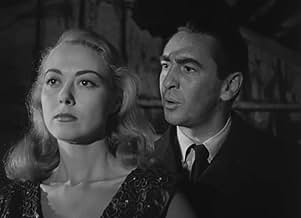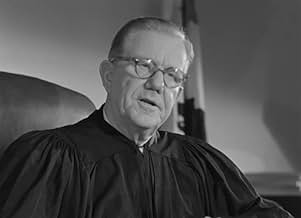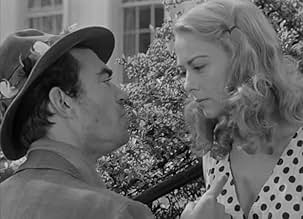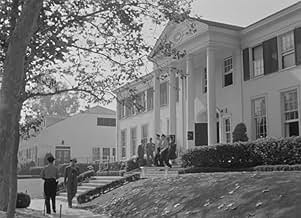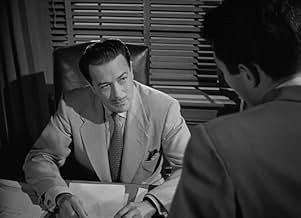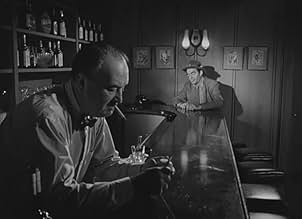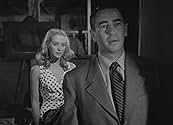VALUTAZIONE IMDb
6,2/10
937
LA TUA VALUTAZIONE
Aggiungi una trama nella tua linguaLawyer defends migrant worker falsely accused of two murders.Lawyer defends migrant worker falsely accused of two murders.Lawyer defends migrant worker falsely accused of two murders.
Frank Baker
- Court Stenographer
- (non citato nei titoli originali)
Marshall Bradford
- Coroner
- (non citato nei titoli originali)
Ralph Brooks
- Courtroom Photographer
- (non citato nei titoli originali)
Benny Burt
- Citizen
- (non citato nei titoli originali)
Jack Carr
- Angry Citizen
- (non citato nei titoli originali)
Robert Carson
- Jury Foreman
- (non citato nei titoli originali)
Ralph Dumke
- Bartender
- (non citato nei titoli originali)
Richard Emory
- Reporter
- (non citato nei titoli originali)
Recensioni in evidenza
A lawyer defends a migrant worker falsely accused of two murders.
What is interesting, first of all, is how the defendant is described as a "migrant worker". That is not incorrect, but I think perhaps the connotation in 1953 is different than in 2017, because now the term would almost exclusively be referring to a Latino employee. In fact, the United Nations defines a migrant worker as "a person who is engaged or has been engaged in a remunerated activity in a State of which he or she is not a national." This, more often than not, would be Mexican farmhands in the case of the United States.
Anyway, the film is quite good. I don't know if it was a feature or a B-movie, as it does give the impression of not having big names attached and perhaps a smaller budget. But for entertainment purposes and a but of suspense, it does the job. In retrospect, it also serves as a great example of early work from director Don Siegel.
What is interesting, first of all, is how the defendant is described as a "migrant worker". That is not incorrect, but I think perhaps the connotation in 1953 is different than in 2017, because now the term would almost exclusively be referring to a Latino employee. In fact, the United Nations defines a migrant worker as "a person who is engaged or has been engaged in a remunerated activity in a State of which he or she is not a national." This, more often than not, would be Mexican farmhands in the case of the United States.
Anyway, the film is quite good. I don't know if it was a feature or a B-movie, as it does give the impression of not having big names attached and perhaps a smaller budget. But for entertainment purposes and a but of suspense, it does the job. In retrospect, it also serves as a great example of early work from director Don Siegel.
MacDonald Carey and Teresa Wright, both of whom starred in Hitchcock's Shadow of a Doubt, work together again in a less prestigious film, "Count the Hours" from 1953, directed by Don Siegel.
Wright is Ellen Braden, whose husband George (John Craven), a migrant worker, is arrested for the murder of an elderly man and his housekeeper that was done apparently during a robbery - the man kept a lot of money in his house.
When asked if he has a gun, he at first says no. His wife runs home and throws the gun in the lake, but she's seen doing it. By then he's admitted to having one. He's believed to be guilty.
Carey plays attorney Doug Madison, who is asked to take the case but refuses. After speaking with Mrs. Braden, he changes his mind. He's convinced that they have to find the gun. But when they do, it's a disappointment. Doug believes in George's innocence, which means they have to find the killer.
Pretty good mystery-suspense film which also features Jack Elam. Wright is sympathetic as the pregnant Ellen who believes in her husband, but John Craven doesn't register much.
Carey was an affable leading man who found his great success on Days of Our Lives. He had a wonderful speaking voice and a gentle presence. Elam is his usual evil-looking and sleazy self.
On the ordinary side but tense nonetheless.
Wright is Ellen Braden, whose husband George (John Craven), a migrant worker, is arrested for the murder of an elderly man and his housekeeper that was done apparently during a robbery - the man kept a lot of money in his house.
When asked if he has a gun, he at first says no. His wife runs home and throws the gun in the lake, but she's seen doing it. By then he's admitted to having one. He's believed to be guilty.
Carey plays attorney Doug Madison, who is asked to take the case but refuses. After speaking with Mrs. Braden, he changes his mind. He's convinced that they have to find the gun. But when they do, it's a disappointment. Doug believes in George's innocence, which means they have to find the killer.
Pretty good mystery-suspense film which also features Jack Elam. Wright is sympathetic as the pregnant Ellen who believes in her husband, but John Craven doesn't register much.
Carey was an affable leading man who found his great success on Days of Our Lives. He had a wonderful speaking voice and a gentle presence. Elam is his usual evil-looking and sleazy self.
On the ordinary side but tense nonetheless.
MacDonald Carey stars as a public defender taking on the case of a migrant farm worker accused of killing his employer in this unusual RKO production. Directed stylishly by Don Siegel and marvelously photographed by the great John Alton, whose penchant for deep, angular shots is on display throughout, Count the Hours has plenty of the ingredients you'd expect a noir classic to feature. Sadly, it's let down by a drab screenplay by Karen Dewolf and a dull, Lon Chaney Jr.-style performance by John Craven as the falsely accused handy man. The film also suffers from a Louis Forbes score that features an overdone theremin theme whenever the real villain appears on the screen. Count the Hours looks great and also features good performances by Teresa Wright (in a role that seems tailor made for Patricia Neal) and Jack Elam, but on balance, it remains a frustrating though watchable failure.
The great director who would make " invasion of the body snatchers" "the killers" "the beguiled" and even Elvis' best ("flaming star") is already present;his flair for film noir and for disturbing atmosphere is glaring in the scene in which the diver tries to rape T. Wright:the way Siegel films his eyes is absolutely terrifying ;ditto for the scenes when the lawyer looks for the former employee;oddly Siegel does not seem to very interested in T.Wright's character and the last scenes are given over to Dolores Moran and Adele Mara,who are relatively obscured thespians compared to the star of "shadow a doubt" and Wyler's war movies.
However,the movie is absorbing and a must for suspense buffs.
Like this ?try these
"phantom lady" (Robert Siodmak,1944)
"time without pity" (Joseph Losey ,1956)
"they won't forget " (Mervyn LeRoy,1937)
However,the movie is absorbing and a must for suspense buffs.
Like this ?try these
"phantom lady" (Robert Siodmak,1944)
"time without pity" (Joseph Losey ,1956)
"they won't forget " (Mervyn LeRoy,1937)
Surprisingly interesting story for a B picture from the early fifties - this could have been made as a major feature if it was given a bigger budget and a director worthy of its plot developments. Sincere performances by Teresa Wright and McDonald Cary are well above the average but director Don Siegel is just not the right man for the job. The story by Doane Hoag has all the right twists and turns and holds the interest but needed more attention to detail and less clichéd handling. The music score was certainly different but seemed to have been lifted from a Si-Fi -'body snatcher' type movie.
If looking for a 50s time passer (with undeveloped possibilities) this is still worth a look. Prolific and inventive Award winning Hungarian cinematographer John Alton shows terrific flair for B/W photography and lighting - lifting this little crime meller to above average standards. The ending is typical of the era - but, still better than many other average B pictures.
If looking for a 50s time passer (with undeveloped possibilities) this is still worth a look. Prolific and inventive Award winning Hungarian cinematographer John Alton shows terrific flair for B/W photography and lighting - lifting this little crime meller to above average standards. The ending is typical of the era - but, still better than many other average B pictures.
Lo sapevi?
- QuizAfter Director of Photography John Alton agreed to shoot this movie, he asked Producer Benedict Bogeaus how much he had budgeted for rigging - the system of overhead pipes, brackets, ropes, and cables that suspend lights over a film set. Bogeaus told him four thousand dollars. "Give me two thousand dollars above my salary and I won't use any rigging," said Alton. He did it by using almost no overhead lighting at all, contributing to the film's rich visual atmosphere.
- BlooperThe screen shows a newspaper article stating that George Braden is about to go on trial for the murder of Fred Morgan. However, two people were killed, so both names should have been given.
- ConnessioniReferenced in Mau Mau Sex Sex (2001)
I più visti
Accedi per valutare e creare un elenco di titoli salvati per ottenere consigli personalizzati
Dettagli
- Data di uscita
- Paese di origine
- Lingua
- Celebre anche come
- Horas amargas
- Luoghi delle riprese
- Azienda produttrice
- Vedi altri crediti dell’azienda su IMDbPro
- Tempo di esecuzione
- 1h 16min(76 min)
- Colore
- Proporzioni
- 1.37 : 1
Contribuisci a questa pagina
Suggerisci una modifica o aggiungi i contenuti mancanti

